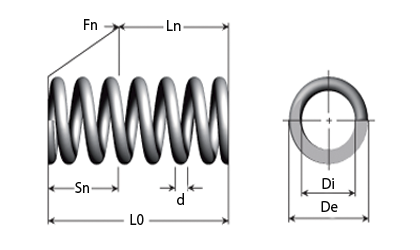Compression springs
Compression springs in piano wire, electrogalvanised wire and stainless steel wire
Order Monday-Thursday before 15:30 and Friday before 14:45 and we’ll dispatch your order the same day with expected delivery within 2-10 days. This applies to all stocked compression springs
See quantity discounts and prices by clicking on the shopping cart next to the required product.
To find the spring you want quickly and easily, use the range sliders.
We have everything from small compression springs used in precision engineering to large compression springs for industrial applications. The selection of standard compression springs covers lengths from 2.00 mm to 1080.00 mm. The selection is produced in accordance with current DIN standards with the highest quality demands in Europe and America.
Compression springs are used in a wide range of products where compressive force is needed. This can include everything from hearing aids, ballpoint pens and lawnmowers, through to industrial machinery and much more.
Compression springs are basically a component that can accumulate force and work at optimal levels for a prolonged period, provided that they are used and dimensioned correctly. The force accumulates in the spring as it is being compressed, and is released when the spring is allowed to return to its original length.
Piano wire springs are recommended for use in dry environments. The material offers no protection against rust. Piano wire springs are approximately 10% stronger than stainless steel springs.
Electrogalvanised compression springs are made from piano wire, which is then electrogalvansed. This gives the compression springs an attractive, shiny surface. Electrogalvanisation only provides moderate corrosion resistance, but if the spring is used in a humid environment, the service life will be prolonged compared to the same spring made from piano wire without surface treatment.
For humid environments we recommend springs made from stainless steel wire. Stainless steel springs are approximately 10% weaker than piano wire springs.
If you use springs in environments where they are exposed to harsh chemicals or salt water, we recommend springs in a specific type of stainless steel (AISI 316).
If you are unsure about the length/travel you need, we have springs in lengths of 300, 500 and 1,000 mm manufactured specifically to be cut to length and used for prototypes and testing. Sort by lengths using the slider below.
6-70016-description
Zinc Plated
6-70014-description
Music wire
6-70015-description
Stainless steel 302
6-70024-description
Stainless steel 316
- C00570060120SIn stock: 689Material Stainless steel 302d - Wire diameter (mm) 0.15De - External diameter (mm) 1.45Di - Internal diameter (mm) 1.15L0 - Unloaded length (mm) 3.05Ln - Max. loaded length (mm) 1.55Sn - Maximum travel (mm) 1.50Fn - Maximum load at Ln (N) 0.85R - Spring constant (N/mm) 0.55Range B
- C00570060120MIn stock: 622Material Music wired - Wire diameter (mm) 0.15De - External diameter (mm) 1.45Di - Internal diameter (mm) 1.15L0 - Unloaded length (mm) 3.05Ln - Max. loaded length (mm) 1.55Sn - Maximum travel (mm) 1.50Fn - Maximum load at Ln (N) 1.02R - Spring constant (N/mm) 0.67Range B
- C00570060190SIn stock: 1,517Material Stainless steel 302d - Wire diameter (mm) 0.15De - External diameter (mm) 1.45Di - Internal diameter (mm) 1.15L0 - Unloaded length (mm) 4.83Ln - Max. loaded length (mm) 2.29Sn - Maximum travel (mm) 2.54Fn - Maximum load at Ln (N) 0.85R - Spring constant (N/mm) 0.32Range B
- C00570060190MIn stock: 213Material Music wired - Wire diameter (mm) 0.15De - External diameter (mm) 1.45Di - Internal diameter (mm) 1.15L0 - Unloaded length (mm) 4.83Ln - Max. loaded length (mm) 2.29Sn - Maximum travel (mm) 2.54Fn - Maximum load at Ln (N) 1.02R - Spring constant (N/mm) 0.39Range B
- C00570060250SIn stock: 640Material Stainless steel 302d - Wire diameter (mm) 0.15De - External diameter (mm) 1.45Di - Internal diameter (mm) 1.15L0 - Unloaded length (mm) 6.35Ln - Max. loaded length (mm) 2.90Sn - Maximum travel (mm) 3.45Fn - Maximum load at Ln (N) 0.85R - Spring constant (N/mm) 0.23Range B
- C00570060250MIn stock: 155Material Music wired - Wire diameter (mm) 0.15De - External diameter (mm) 1.45Di - Internal diameter (mm) 1.15L0 - Unloaded length (mm) 6.35Ln - Max. loaded length (mm) 2.90Sn - Maximum travel (mm) 3.45Fn - Maximum load at Ln (N) 1.02R - Spring constant (N/mm) 0.28Range B
- C00570060310SIn stock: 8,651Material Stainless steel 302d - Wire diameter (mm) 0.15De - External diameter (mm) 1.45Di - Internal diameter (mm) 1.15L0 - Unloaded length (mm) 7.87Ln - Max. loaded length (mm) 3.51Sn - Maximum travel (mm) 4.36Fn - Maximum load at Ln (N) 0.85R - Spring constant (N/mm) 0.19Range B
- C00570060310MIn stock: 9,165Material Music wired - Wire diameter (mm) 0.15De - External diameter (mm) 1.45Di - Internal diameter (mm) 1.15L0 - Unloaded length (mm) 7.87Ln - Max. loaded length (mm) 3.51Sn - Maximum travel (mm) 4.36Fn - Maximum load at Ln (N) 1.02R - Spring constant (N/mm) 0.23Range B
- C00570060380SIn stock: 1,961Material Stainless steel 302d - Wire diameter (mm) 0.15De - External diameter (mm) 1.45Di - Internal diameter (mm) 1.15L0 - Unloaded length (mm) 9.65Ln - Max. loaded length (mm) 4.24Sn - Maximum travel (mm) 5.41Fn - Maximum load at Ln (N) 0.85R - Spring constant (N/mm) 0.16Range B
- C00570060380MIn stock: 549Material Music wired - Wire diameter (mm) 0.15De - External diameter (mm) 1.45Di - Internal diameter (mm) 1.15L0 - Unloaded length (mm) 9.65Ln - Max. loaded length (mm) 4.24Sn - Maximum travel (mm) 5.41Fn - Maximum load at Ln (N) 1.02R - Spring constant (N/mm) 0.19Range B
The wire is certified in accordance with DIN 17223 Class C Wire WERKSTOFF NO. 1.1200 – EN Norm 10270-1
Working temperature between -30 ºC and +120 ºC
Recommended for use in dry environments.
The wire is certified in accordance with DIN 17224 AISI 302 WERKSTOFF NO. 1.4310 – EN Norm 10270-3
Working temperature between -200 ºC and +250 ºC
Can be used in dry and humid or wet environments.
The wire is certified in accordance with DIN 17224 AISI 316 WERKSTOFF NO. 1.4401 – EN Norm 10270-3
Working temperature between -200 ºC and +250 ºC
Can be used in dry and humid or wet environments. Used in constructions that are exposed to harsh cleaning agents or in maritime environments
The wire is certified in accordance with DIN 17223 Class C Wire WERKSTOFF NO. 1.1200 – EN Norm 10270-1
Working temperature between -30 ºC and +120 ºC
Galvanised compression springs are made from piano wire, which is then electrogalvanised. Electrogalvanisation means that the compression spring is given a shiny, more corrosion-resistant surface.
Recommended for use in dry environments.
Series A and C: (See which series a spring belongs to in the “Series” column in the table. )
DIN 2098 defines the spring’s dimensions based on wire thickness.
DIN 2095 defines the force as the determining parameter. The number of coils will therefore vary. L0 is for guidance only and may well be longer than stated in the tables. Once loaded the spring will set itself and thus achieve the correct length. Deviations are usually observed with a large coil ratio ((De - d) / d), where the spring has a thin wire in relation to the diameter.
Mean diameter Tolerances
(mm)
(mm)
Coil ratio (Dm / d)
Series B: (See which series a spring belongs to in the “Series” column in the table.)
In this series, the number of coils is not specified, as the spring is produced with a defined unloaded length and a specific force. In order to achieve the forces, the number of coils will be the variable.
Series D: (See which series a spring belongs to in the “Series” column in the table. )
The series is produced for use in testing and prototyping. There are therefore no tolerances for this series. As this series is designed for testing, the cut spring’s coils will vary from spring to spring, and so the spring constant cannot be defined.
If you want a PDF datasheet or a 3D CAD drawing of the spring in .step, .iges or .sat format, these can be downloaded for free by clicking on the 3D CAD symbol next to the item number in the table.
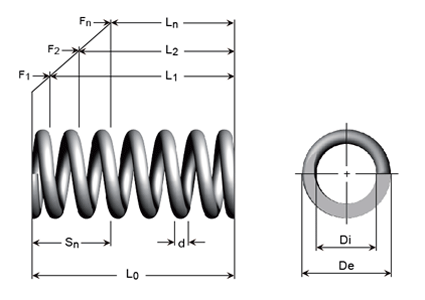
If you want to know how much force a compression spring produces for a given length/travel, you can use the following formula:
Travel (s) x Spring constant ® (R)
If a spring is compressed 16 mm (s) and has a spring constant of 3 N/mm (R), this produces a force of: 16 mm x 3 N/mm = 48 N
16 mm x 3 N/mm = 48 N (ca. 4,8kg)
If a compression spring with a very high spring constant and carrying capacity is required, coloured die springs may be recommended. Read more
The spring constant tells you how much force a spring produces per millimetre when it is compressed. If a spring has a spring constant of 1.5 N/mm and it is compressed 10 mm, then the force of the spring is 15 N.
Series A, B and C: The spring constant is given in the table.
Series D: There are no spring constants for this range of springs. These springs are designed to test and try where the springs can be shortened to achieve the desired length. The spring constant depends on the length, so we are unable to provide a general spring constant.
Series A:
(See which series a spring belongs to in the “Series” column in the table. )
Springs with a wire thickness of up to 0.8 mm are closed but unground.
Springs with a wire thickness of 1.0 mm and above are closed and ground.
Series B and C:
(See which series a spring belongs to in the “Series” column in the table. )
The product page for each individual product shows if it is closed and ground or unground.
Series D:
(See which series a spring belongs to in the “Series” column in the table. )
As the series is produced for testing and cutting, the design of the ends is not defined.
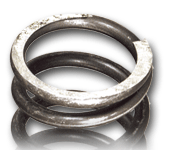
Closed, ground
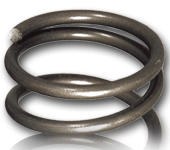
Closed, unground
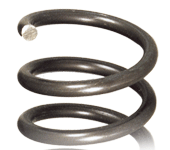
Not closed
Usually right. The force and application is not affected by the direction of wind.
Standard compression springs are not defined with a specific direction of wind. Depending on production, the springs may be either right or left wound. If a specific direction of wind is required, it is possible to have them produced as special springs.
The service life of a spring is generally very difficult to define. A large number of parameters come into play, and it is therefore impossible to define a service life.
Parameters with a significant influence on service life include: Installation, installation method, number of movements, vibrations, shocks, torsion, length of travel, non-axial travel, temperature, wear against other surfaces, environment of use, any cleaning agents, lateral impacts, etc.
Always dimension a compression spring so that it delivers the desired travel and force with as little exertion as possible. This will give the spring the longest possible service life.
Applying the maximum load to the spring or exceeding it will shorten its service life and may cause it to become permanently distorted.
Therefore we recommend that you do not use more than 75% of the maximum travel (Sn) of conical springs.
If the compression spring is compressed to Ln (the max. loaded length), it will set itself. It will then not return to its original length.


